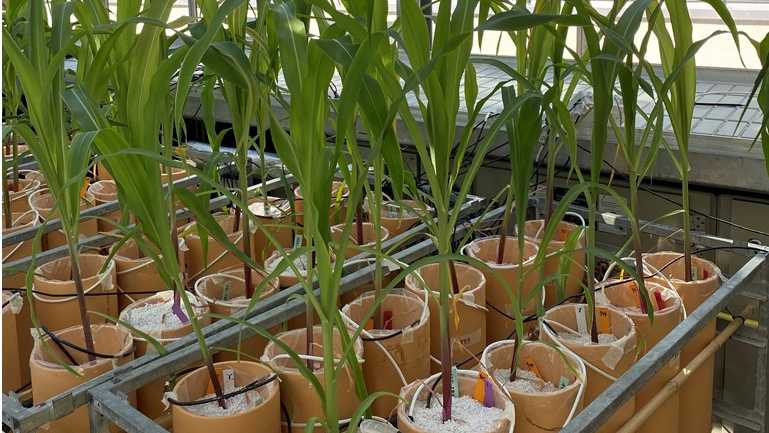MICROSEL
Selection of root microbiomes to improve tolerance of maize to low nitrogen and drought using host-mediated indirect selection

Background
Suboptimal availabilities of nitrogen (N) and water in field soils are two of the most limiting factors in agriculture. Mineral fertilization and irrigation are therefore primary components of crop production in modern agroecosystems, but the excessive use of external inputs coupled with low uptake and use efficiencies of many modern crop cultivars are threatening the environment worldwide. For this reason, it is crucial to invest in novel technologies to increase resource use efficiency of crops to meet the growing global demand for food in a more sustainable way. There is increasing evidence that the selection of root microbiomes and root phenotypes under N deficiency and drought can increase plant productivity and stress resilience, but still little is known about their interaction under stress, and the influence of the plant genotype of ancient and modern crop varieties on both root development and microbiome composition and functioning. Novel approaches to engineer microbiomes in association with specific root phenotypes such as host-mediated indirect selection (HMIS), in combination with advanced molecular technologies such as metagenomics and metabolomics, might be harnessed to select for beneficial combinations of root phenotypes and root microbiomes that optimize nutrient use efficiency under reduced N input and drought.
Objectives
The overall aim of this project is to develop a novel technology to improve tolerance of maize towards N and P limitation by applying HMIS of microbiomes in synergy with root phenotyping in different ancient and modern maize varieties. The specific objectives are:
- to evaluate the performance of ancient and modern maize genotypes with their root phenotypes and respective root microbiomes under low-input conditions (combined low N/drought).
- to select root microbiomes associated with higher plant performance under low N availability and drought via HMIS.
- to evaluate the effectiveness of the HMIS-selected microbiomes and their relative contribution to plant tolerance under low N and drought.
- to characterize enriched, potentially beneficial microbial taxa to spur bioinoculant production efforts.
Outcomes
The application of HMIS in synergy with root phenotyping is a completely novel approach to improve plant tolerance towards multiple stressors and can provide new insights for plant breeding and bioinoculant production for a more sustainable agriculture. This project will provide a replicable approach for improving plant performance under N water limitations and identify microbial taxa with beneficial traits for plant growth under low-input systems.
Country: Switzerland
System: Greenhouse-grown maize mesocosm
Project duration: 4 years
Project partner: Dr. Tania Galindo Castañeda (SAE, ETH), Prof. Dr. Johan Six (SAE, ETH), Prof. Dr. Mark Mescher s (Biocommunication, ETH), Prof. Dr. Jonathan Lynch (The Pennsylvania State University)
Project funding: SNSF research project granted to Martin Hartmann

Contact info: Tania Galindo () and Martin Hartmann ()